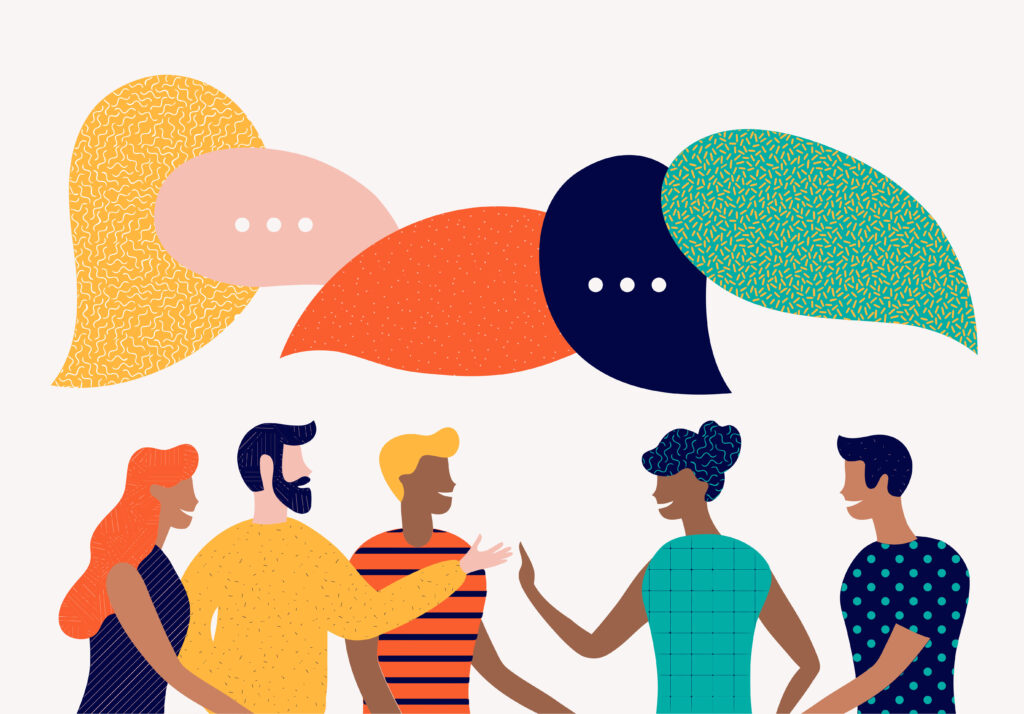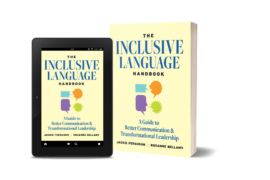Examples and Tips for Better Communication with Diverse Teams
As workplaces become increasingly diverse, it’s important to show that everyone is valued for who they are. That’s why using inclusive language is so important. Anyone who works on a well-functioning team understands that inclusive language can help build relationships, improve communication, and in general, help people work better together.
It’s also important to consider the alternative: What happens when we say things that unintentionally offend another person or make them uncomfortable? Our thoughtless word choices might alienate a colleague or make them not want to work with us or at the company.
The words and phrases we use demonstrate the way we think, how we were raised, and how we see others. And unfortunately, sometimes we reach for words out of habit that don’t reflect our values. Many common expressions reinforce outdated attitudes about gender identity, sexual orientation, race, class, disability, and age. Practicing inclusive language – being mindful of how we speak to each other – helps us form new conversational habits.

To help improve these everyday conversations, here are some frequently asked questions and several examples of inclusive language:
How is inclusive language different from politically correct language?
While political correctness focuses on trying not to offend, inclusive language seeks to acknowledge and respect all people’s identities. In other words, “political correctness” means intentionally avoiding saying the wrong thing, and inclusive language means using words that respectfully describe another person.
While it’s important to avoid offending other people, a desire to be politically correct can make us hesitant to engage with people who are different from us. Inclusive language principles provide a framework to reaffirm each person’s individuality and break down communication barriers.
Why is inclusive language important in the workplace?
When we use inclusive language, we reject the false notion that some people, identities, or experiences are “normal” while others are inferior, broken, or incomplete. In any conversation, but particularly in a diverse workplace, it’s vital to avoid the many common phrases that have discriminatory origins. For example, “off the reservation,” “cakewalk,” “grandfathered in,” and even “Eenie, meenie, miney, mo” have racist roots.
Using inclusive language at work prevents the harm that these insensitive expressions often cause. It also works to eliminate microaggressions, which are casual, inadvertent insults that can contribute to a sense of inequality.
When people feel defined by their otherness, feel excluded from the conversation, or believe their perspectives are not welcome, they are less likely to contribute ideas or to do great work. They are also more likely to look for employment elsewhere.
How can inclusive language help my business?
Successful business relies on one thing — communication. Organizations can’t sell products, build customer loyalty, form partnerships, enlist volunteers, or hire talented employees unless they can convey their message effectively. As society becomes more diverse, business leaders need to be able to communicate effectively to a broad audience.
Inclusive language can help businesses reach more people and build long-term customer relationships. It’s important to be conscious of who your audience is and understand how to make people feel included. Inclusive language can help salespeople close more deals, healthcare professionals connect with clients, real estate agents sell more houses, and hospitality workers be more welcoming. For example, a restaurant server might automatically say “Yes, ma’am” or “Thank you, sir,” but these aren’t inclusive responses. These seemingly polite phrases could alienate potential customers who are nonbinary. “Yes, indeed” and “Thank you very much” are better, more inclusive alternatives.

What are some examples of exclusive language and inclusive alternatives?
You guys: This is a common expression, especially in the Northeast. It might take a conscious effort to avoid this phrase, but it’s so important to refer to groups in inclusive and gender-neutral manners. Instead, use “all,” “everyone,” “you all,” “y’all,” “friends,” or “team.”
Normal: It’s never appropriate to refer to someone as “normal,” as it implies that other people are somehow abnormal or deficient.
Addicting, starving: Exaggeration can sometimes create situations where a real condition is trivialized. Using the word “addicting” minimizes people’s real experience with addiction. Good substitutes might be “delicious,” “yummy,” or “tasty.” Using “starving” instead of “hungry” can similarly trivialize personal hardship.
Crazy, OCD: Using mental health language in casual conversation also trivializes legitimate mental health conditions. Someone who is behaving unexpectedly could be described as “erratic,” or someone who likes to clean could be “tidy” or “organized.”
Master bedroom: While the description of a home’s main bedroom doesn’t have any connection with slavery, the phrase should still be avoided. The gendered expression dates from the 1920s, when it was assumed the primary breadwinner in a household was a man. “Ensuite bedroom” or “primary bedroom” are better choices.
Long time no see: An example of Pidgin or simplified English, this phrase originated as a way to mock Native Americans. Instead, a phrase such as “I haven’t seen you in a long time” is more appropriate.
To learn more about inclusive language, read The Inclusive Language Handbook: A Guide to Better Communication and Transformational Leadership.






